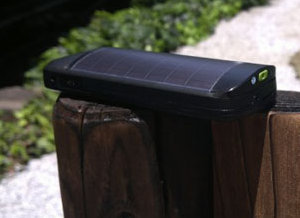Solar-powered phones still a pipedream, says Nokia

Sunbathing mobiles can't get up to that much yet, study finds...

Nokia's prototype mobile for testing solar-chargingPhoto: Nokia
Nokia has revealed the results of a three-month long research project looking into whether a mobile phone can be powered by solar energy alone. The project's findings suggest a solely sun-powered mobile remains a pipe-dream for now.
Nokia said its tests show that charging a mobile with only a solar panel on the back is "possible but challenging" - only producing enough energy for very limited use.
The mobile maker asked five people to test a prototype version of the Nokia C1-02 handset, augmented with solar charging panels on the back (pictured above). The research took place between June 2011 and the end of September at four test locations, selected to ensure a variety of sunshine conditions: Kenya, Sweden, the Baltic sea and the Arctic circle.
"When carefully positioned, the prototype phones were able, at best, to harvest enough energy to keep the phone on standby mode but with a very restricted amount of talk time," said Nokia on the research project's blog.
According to Nokia, the biggest challenge for solar-powered mobiles is the limited space on mobiles for solar panels - which restricts the amount of power that can be generated.
The research also showed that the charge generated by the prototypes was not solely dependent on the amount of sunlight and local weather conditions. Factors such as the mobile user's lifestyle and the angle of sunlight also have a "significant impact" on the amount of charge generated.
Unsurprisingly, the greatest amount of charge was generated by Nokia's tester in Kenya where there was no shortage of sun and the tester was able to charge the device for nearly 12 hours per day. In 59 days of solar charge testing, the Kenyan handset was able to support 20 hours of talk time or offer sufficient standby for 41 days.
The Kenya-based tester also worked as a security guard, meaning his lifestyle suited solar-charging as he was often stationary - enabling the phone to soak up more rays.
Meanwhile, Nokia's Arctic Circle testers produced what it described as "reasonably good" results but did so by moving the prototype around a house to track the summer sun and by carrying it in a holder around their necks when outdoors. Nokia noted that 'necklace mobiles' are not exactly "stylish or convenient".